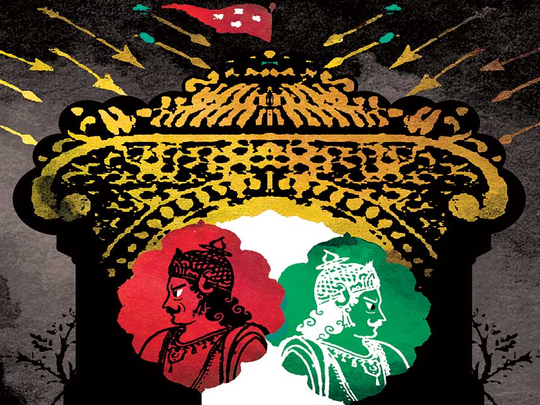
Rise of Kali: Duryodhana’s Mahabharata (Ajaya Book 2)
By Anand Neelakantan, Platinum Press, 530 pages, Dh22
What constitutes “dharma”?
The Sanskrit term has been one of the core values of Hindu philosophy through millennia. While it loosely translates as religion, it is also equally used to describe righteousness, duty or virtuosity. Thus the eternal debate between “dharma” and “adharma”, or between right and wrong, or if you so choose, between to be religious and irreligious.
This debate is at the core of the “Mahabharata” (originally named Jaya), the greatest Indian epic. In this vast work from antiquity, the case of dharma versus adharma is presented as a tussle between the cousins Pandavas and Kauravas, who fight for their ancestral kingdom of Hastinapura. While the Pandavas are considered the epitome of virtue, the Kauravas, led by the prince Duryodhana, are portrayed as the fountainhead of evil and irreligiousness.
But is it easy to paint life in such stark shades of black and white? History, as the former British Prime Minister Winston Churchill put it, is written by the victors. The final war of the Mahabharata, at Kurukhestra near the modern Indian capital of Delhi, has been interpreted as a narration of past true events, with historians placing the date variously between 3100BC and 1500BC.
However, what if the actual story was different? This is what Indian writer Anand Neelakantan, who has been rated as one of the most remarkable writers of the country by the newspaper “DNA”, sets to go about in his “Ajaya” series. In this, the “evil” prince Duryodhana is portrayed as a simple, kindly man who strongly defends his friends against all odds, strives for equality among all and fights against India’s biggest bane, the caste system.
The first book of Ajaya told us the story of the “Mahabharata” from Duryodhana’s point of view (he is named Suyodhana, as in the original Jaya epic, which means brave warrior), reaching the point where the Pandavas have lost their kingdom and their common wife Draupadi in a game of dice. “The rise of Kali”, the second book, takes off from this point. As Draupadi is stripped in the royal court (the one action Suyodhana repents throughout the rest of his life), the Pandavas are sent into exile for 12 years, after being defeated at another game of dice.
The real villain in Neelakantan’s version of the epic is Shakuni, Duryodhana’s maternal uncle, whose kingdom Gandhara (in modern Afghanistan), was ransacked by his great uncle Bhisma, killing the Gandhara king and all the princes except him and his elder sister Gandhari, who is married off to his father. Witnessing the carnage, Shakuni vows revenge of decimating the Kuru dynasty, to which both the Pandavas and Kauravas belong.
One of the main episodes of the “Mahabharata” is the “Bhagvad Gita” (the Song of God), in which Krishna, regarded as one of the incarnations of Vishnu, one of the three main deities of the Hindu pantheon, exhorts Arjuna, the third Pandava prince and principal warrior, about dharma. Standing in the battlefield, Arjuna is overwhelmed with emotion as he sees his family members, many of whom are dear to him, facing him on the other side. He sees it pointless to fight when so much death and destruction is likely to occur. Krishna exhorts him by saying as a Kshatriya (warrior caste), it is his dharma (in this case duty), to fight and not worry about the consequences.
In the battle itself, the Pandavas, so long considered the symbol of dharma (in this case righteousness); break almost every rule of the warrior code. Arjuna shoots his great uncle Bhisma by hiding behind a eunuch. Bhisma lays his weapons aside as it is against his dharma (in this case principle) to shoot at a woman (the eunuch Shikhandi was born a woman).
Later, Yudhishthira, the eldest Pandava prince, who never uttered a lie in his life, stoops to utter a semi-truth when his brothers kill a war elephant of the same name as their guru Drona’s son. When Drona, who was leading the Kaurava army, appeals to Yudhishthira about the actual course of event, the eldest Pandava prince says yes, but softly says “it is an elephant”. Not having heard this, Drona, in the grief of losing his son, lays down his arms, when his head is cut off. Again, Arjuna kills Karna when he is unarmed and trying to release his chariot wheel from a marsh. Thus the Pandavas eliminated three key warriors in the enemy camp when they were unarmed.
The final act of the war is a Gadayuddha (battle of the mace) is between Duryodhana and Bhima. Here, too, Duryodhana’s status as an honourable warrior is sealed as when Yudhishthira asks him to choose any of the five Pandava brothers for a duel, he chooses Bhima, the most powerful of them, and also one who is adept at wielding the mace. However, here too, Bhima breaks the rule book as he breaks Duryodhana’s thighs, while hitting below the waist is forbidden.
Throughout history, most critiques and adaptations of the story have mostly sung praise of the Pandavas. However, there have been nuggets of discourse depicting the other view. The most celebrated one is “Urubhanga”, a Sanskrit play written by the poet Bhasa in the 2nd or 3rd century AD, where Duryodhana is depicted with heroic traits.
A similar strain can be found almost seven centuries later, in the poem “Gadayuddha” by Ranna, a Jain Kannada poet of the 10th century. “Though Bhima is meant to be the hero of the poem, Duryodhana even with all his past sinful acts emerges as the hero and rises to tragic heights exhibiting noble qualities of ideal friendship and unbounded parental and brotherly affection,” says an entry in the “Encyclopaedia of Indian Literature (Volume 2)”.
Neelakantan has now established himself as a master of the downtrodden, giving a voice to the loser. The book is also a scathing attack on India’s age-old caste system, the ill-effects of which can be witnessed even today.
His portrayal of Duryodhana brings forth the man as a just ruler, who sees his dharma (in this case duty) to establish a fair and equitable society free from the bondage of caste prejudices. However, Duryodhana also comes across as an emotional and gullible person, easily swayed by personal fortunes. As a crown prince of the empire, he could not have let his emotions rule in the dice game, when he fell to Shakuni’s machinations, thus laying ground for the Kurukhestra war.
The final word on the epic, I think, can be found in Amartya Sen’s “Idea of Justice”, where the Nobel laureate says: “The epic ‘Mahabharata’ ends largely as a tragedy, with a lamentation about death and carnage, and there is anguish and grief accompanying the victory and triumph of the ‘just’ cause. It is hard not to see in this something of a vindication of Arjuna’s profound doubts.”









